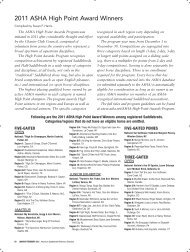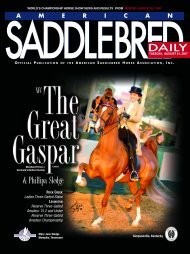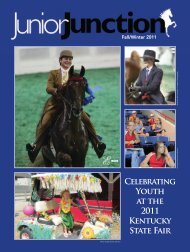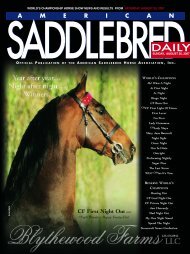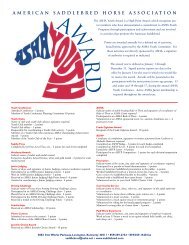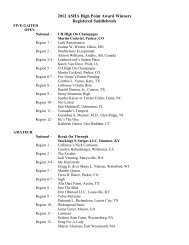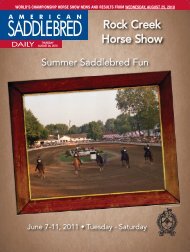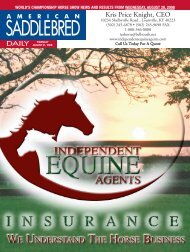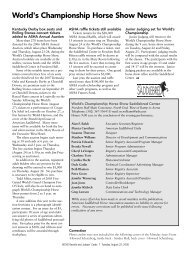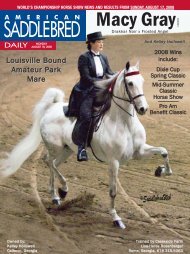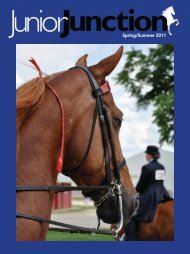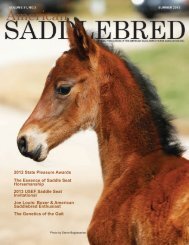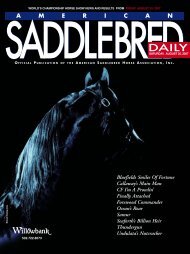SADDLEBRED - American Saddlebred Horse Association
SADDLEBRED - American Saddlebred Horse Association
SADDLEBRED - American Saddlebred Horse Association
Create successful ePaper yourself
Turn your PDF publications into a flip-book with our unique Google optimized e-Paper software.
A Look at the Life and Advice of Charles J. “June” Cronan<br />
Editor’s Note: This story originally<br />
appeared in the September 2001 issue of<br />
Equestrian magazine. It is reprinted with<br />
permission.<br />
My grandfather,<br />
Charles J. “June” Cronan,<br />
a Kentucky native,<br />
was involved with <strong>Saddlebred</strong>s<br />
since the early<br />
part of the last century.<br />
He was known as one<br />
MIKE CRONAN<br />
of the most stalwart<br />
supporters of the effort<br />
to consolidate showmen of the country<br />
until his death in 1984. He served the<br />
<strong>American</strong> <strong>Horse</strong> Shows <strong>Association</strong><br />
(AHSA) as Chairman of the Saddle<br />
<strong>Horse</strong> Committee, was a member of the<br />
Board of Directors and Executive Committee<br />
and a Vice President for Zone 5.<br />
Some people in the horse world considered<br />
him to have been an aristocrat,<br />
which is not true, so I would like to take<br />
this opportunity to explain his background.<br />
He started the <strong>American</strong> Saddle<br />
<strong>Horse</strong> Breeders Futurity of Kentucky<br />
many years ago with $1,160 paid out of<br />
his own pocket, before becoming an officer<br />
of the <strong>American</strong> Saddle <strong>Horse</strong> Breeders<br />
<strong>Association</strong> (ASHBA). He was<br />
concerned that the <strong>Saddlebred</strong> horses<br />
might become extinct due to a public<br />
misperception that their use is limited to<br />
professionals riding in the show ring,<br />
and a further misperception that their<br />
temperament make them unsuitable for<br />
any other purpose.<br />
I am proud to say<br />
that he was a man of<br />
majestic military bearing<br />
and, as a youthful recipient<br />
of his discipline, a<br />
person who could occasionally<br />
inspire awe and<br />
fear. He was also a gentleman<br />
who was unfailingly<br />
courteous, polite,<br />
dignified, and conservative.<br />
At the same time, I<br />
believe those who knew<br />
him would also say he<br />
was warm, outgoing,<br />
gracious and humorous.<br />
I can affirm both his<br />
early role in developing the Futurity, as<br />
well as his belief that the <strong>Saddlebred</strong><br />
“<br />
He was<br />
concerned<br />
that the <strong>Saddlebred</strong><br />
horses might become<br />
extinct due to a public<br />
misperception that their<br />
use is limited to<br />
professionals riding in the<br />
show ring, and a further<br />
misperception that their<br />
temperament make them<br />
unsuitable for any other<br />
purpose.”<br />
horse was ideally suited not just to the<br />
show ring, but also to trail riding, carriage<br />
pulling, cattle roping, fox hunting<br />
and just about anything else you might<br />
want to do with a horse.<br />
Born in 1985, his “aristocratic” pedigree<br />
cannot be traced back any further<br />
than the mid 1800s to his Irish immigrant<br />
grandparents who came to Kentucky<br />
with thousands of others who<br />
came to Kentucky to avoid the Irish potato<br />
famine. Make no mistake; he was<br />
proud of his Irish heritage, but an aristocrat<br />
he was not!<br />
At the age of 11, he acquired his first<br />
horse, a Standardbred mare named Adraline.<br />
Richlieu King won the five-gaited<br />
stake when Granddaddy was 18. Thinking<br />
that horse more beautiful than any he<br />
had ever seen, he twisted his father’s arm<br />
for the breeding fee and rode Adraline 35<br />
miles overnight to be bred to the stakes<br />
winner. Adraline died at age 35, still in<br />
my grandfather’s possession.<br />
He had neither monetary wealth nor<br />
land. His parents owned a house in<br />
Louisville but no plantation, no farm,<br />
not even a stable. Perhaps as a result, in<br />
the late 1920s, Grandaddy and other<br />
Louisvillians formed the Rock Creek<br />
Riding Club as a place to keep horses<br />
and to be with friends who loved horses.<br />
Family cross-country rides were the<br />
order of the day, not the glamorous<br />
horse show for which Rock Creek has<br />
become known.<br />
He came by his military bearing the<br />
old-fashioned way, beginning as a private<br />
in World War I and<br />
eventually retiring from<br />
the Kentucky National<br />
Guard as a colonel after<br />
World War II. On September<br />
18, 1917, a day<br />
after graduating from<br />
law school, he enlisted<br />
in the horse-drawn field<br />
artillery. Many years<br />
later, in a speech to 4-H<br />
Club members, Granddaddy<br />
recounted how<br />
his company commander<br />
in 1917 was<br />
afraid of horses and,<br />
upon learning of Granddaddy’s<br />
experience, assigned him to pick<br />
a good horse and “wear it out” before<br />
World’s Championship <strong>Horse</strong> Show Results and Judges’ Cards | 7 | Sunday, August 29, 2010<br />
Photo courtesy the Cronan Family, Headshot courtesy Gayle Strickroot<br />
Charles J. “June” Cronan was heavily<br />
involved in the <strong>Saddlebred</strong> industry prior to<br />
his death in 1984.<br />
the commander had to ride it in company<br />
formations. Later, as horses were<br />
being phased out of the military, Granddaddy<br />
and others continued to use them<br />
in polo matches between military units.<br />
In 1946, after his return from active<br />
service in World War II, Granddaddy<br />
borrowed money and bought 120 acres,<br />
which became Shamrock Farm on Murphy<br />
Lane in eastern Jefferson County. It<br />
was there for the next 18-plus years. My<br />
family and I had the pleasure of living<br />
and working on the same farm as my<br />
grandparents. I can assure you that<br />
Granddaddy was not sitting under a<br />
shade tree in a white suit sipping mint<br />
juleps. To the contrary, he arose every<br />
morning at 5:30, attended Catholic<br />
mass at a local church, and then returned<br />
home to wake up anybody on<br />
the farm who might still have been<br />
asleep! There was always work to be<br />
done. Granddaddy enlisted the services<br />
of anyone who was around, but he,<br />
himself, also baled hay, drove the tractor,<br />
herded cattle, mucked out stalls,<br />
picked hooves, cleaned tack and, to the



